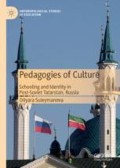Abstract
The conclusion summarizes the main findings of the book and places them within the larger debates on political, social and cultural developments in post-Soviet Russia. Educational policies remain fundamental to the construction and articulation of national identities and to the strategies of dealing with ethnic diversity in Russia. Currently, they are dominated by centralization and homogenization agenda. Conclusion further on extends the main arguments of the book by raising questions about the role of school in shaping, transforming and remolding identities. While the role of education in the construction of national identity is often being taken for granted, anthropological analysis brings to the light the fact that these processes are torn by struggles and contradictions more than it might seem on the first sight.
Access this chapter
Tax calculation will be finalised at checkout
Purchases are for personal use only
Notes
- 1.
Nowadays, one hears much more Tatar speech on the streets of Kazan than in the 1990s. Speaking Tatar in urban spaces became revalorized.
References
Adely, F. J. (2012). Gendered paradoxes: Educating Jordanian women in nation, faith, and progress. Chicago: University of Chicago Press.
Coe, C. (2005). Dilemmas of culture in African schools: Youth, nationalism, and the transformation of knowledge. Chicago: University of Chicago Press.
Graney, K. (2009). Of Khans and Kremlins: Tatarstan and the future of ethno-federalism in Russia. Lanham, MD: Lexington Books.
Linnekin, J. (1991). Cultural invention and the dilemma of authenticity. American Anthropologist, 93(2), 446–449.
Reed-Danahay, D. (1996). Education and identity in rural France: The politics of schooling. Cambridge, UK: Cambridge University Press.
Stambach, A. (2000). Lessons from Mount Kilimanjaro: Schooling, community, and gender in East Africa. New York: Routledge.
Stambach, A. (2009). Faith in schools: Religion, education, and American evangelicals in East Africa. Stanford, CA: Stanford University Press.
Suleymanova, D. (2018). Creative cultural production and ethnocultural revitalization among minority groups in Russia. Cultural Studies, 32(5), 825–851. https://doi.org/10.1080/09502386.2018.1429004
Author information
Authors and Affiliations
Corresponding author
Rights and permissions
Copyright information
© 2020 The Author(s)
About this chapter
Cite this chapter
Suleymanova, D. (2020). Conclusion. In: Pedagogies of Culture. Anthropological Studies of Education. Palgrave Macmillan, Cham. https://doi.org/10.1007/978-3-030-27245-6_7
Download citation
DOI: https://doi.org/10.1007/978-3-030-27245-6_7
Published:
Publisher Name: Palgrave Macmillan, Cham
Print ISBN: 978-3-030-27244-9
Online ISBN: 978-3-030-27245-6
eBook Packages: Social SciencesSocial Sciences (R0)

